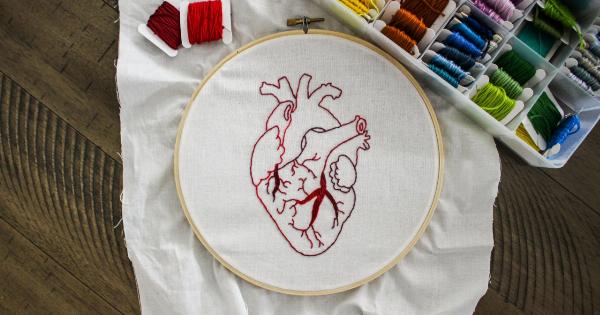A high-fiber diet has numerous benefits for heart health. Not only does it help to lower cholesterol levels and manage blood pressure, but it can also reduce the risk of developing heart disease.
The American Heart Association recommends consuming at least 25 to 30 grams of fiber per day from a variety of sources. Incorporating fiber-rich foods into your daily diet can greatly contribute to boosting heart health.
1. Whole Grains
Whole grains such as oats, brown rice, quinoa, and whole wheat are excellent sources of dietary fiber. These grains are high in soluble fiber, which has been shown to help lower bad cholesterol levels.
Soluble fiber forms a gel-like substance in the digestive system, preventing the absorption of cholesterol into the bloodstream. Consumption of whole grains can reduce the risk of heart disease by improving cholesterol profiles and reducing inflammation.
2. Legumes
Legumes, including beans, lentils, and chickpeas, are rich in fiber, plant-based protein, and other heart-healthy nutrients.
These fiber-rich foods not only help lower cholesterol levels but also promote a feeling of fullness, which can aid in weight management and prevent overeating. Incorporating legumes into your meals regularly can support heart health by reducing the risk factors associated with cardiovascular diseases.
3. Fruits
Fruits such as apples, berries, pears, and citrus fruits are not only delicious but also packed with fiber. The soluble fiber found in fruits helps to lower cholesterol levels and maintain healthy blood pressure.
Additionally, fruits contain antioxidants, vitamins, and minerals that contribute to overall heart health. Regular consumption of fiber-rich fruits can decrease the risk of heart disease and improve cardiovascular function.
4. Vegetables
Vegetables, especially those with vibrant colors, are loaded with fiber and essential nutrients necessary for maintaining a healthy heart.
Leafy greens like spinach and kale, as well as cruciferous vegetables like broccoli and Brussels sprouts, are excellent sources of dietary fiber. These fiber-rich foods assist in managing weight, reducing cholesterol levels, and maintaining blood pressure within a healthy range. Including a variety of vegetables in your diet is essential for a heart-healthy lifestyle.
5. Nuts and Seeds
Nuts and seeds, such as almonds, walnuts, chia seeds, and flaxseeds, are not only rich in healthy fats but also high in fiber.
Consuming a handful of nuts or incorporating them into meals can increase fiber intake and provide numerous heart-protective benefits. The fiber in nuts and seeds aids in reducing cholesterol levels while the healthy fats contribute to a healthy heart by lowering inflammation and promoting optimal blood vessel function.
6. Oatmeal
Starting your day with a bowl of oatmeal is an excellent way to boost heart health. Oats are a great source of soluble fiber, which helps to reduce bad cholesterol levels.
The beta-glucan fiber found in oats has been shown to lower both total and LDL cholesterol, reducing the risk of heart disease. Adding fruits, nuts, or seeds to your oatmeal can further enhance its nutritional value and promote a healthy cardiovascular system.
7. Whole Grain Bread
Replace refined grains with whole grain bread to increase your fiber intake and improve heart health. Whole grain bread is made from unrefined grains, ensuring that the bran and germ, which contain most of the fiber, are retained.
This type of bread is higher in fiber, essential nutrients, and antioxidants compared to white bread. Incorporating whole grain bread into your meals helps maintain healthy cholesterol levels and supports heart health.
8. Dark Chocolate
Good news for chocolate lovers! Dark chocolate, specifically those with a cocoa content of 70% or higher, can be a part of a heart-healthy diet. Dark chocolate contains fiber and flavonoids, which are powerful antioxidants that promote heart health.
The antioxidants in dark chocolate help to decrease inflammation and improve blood flow. However, moderation is key as chocolate is high in calories. Enjoying a small piece of dark chocolate as an occasional treat can be a delicious way to support heart health.
9. Bran Cereal
Bran cereals, such as wheat bran or oat bran, are excellent sources of dietary fiber. They provide a significant amount of insoluble fiber, which aids in regular bowel movements and prevents constipation.
Regular consumption of bran cereal can also help lower LDL cholesterol levels. Adding bran cereal to your breakfast routine can be a simple yet effective way to increase fiber intake and support heart health.
10. Flaxseeds
Flaxseeds are tiny powerhouses packed with fiber, omega-3 fatty acids, and lignans. These seeds are an excellent source of soluble and insoluble fiber, contributing to heart health.
The soluble fiber in flaxseeds helps to lower cholesterol levels, while the insoluble fiber promotes regular bowel movements. Furthermore, flaxseeds are rich in omega-3 fatty acids, which have been shown to reduce inflammation and support heart health.
Incorporating ground flaxseeds into smoothies, yogurt, or baked goods can be an easy way to boost fiber intake and promote heart health.




























